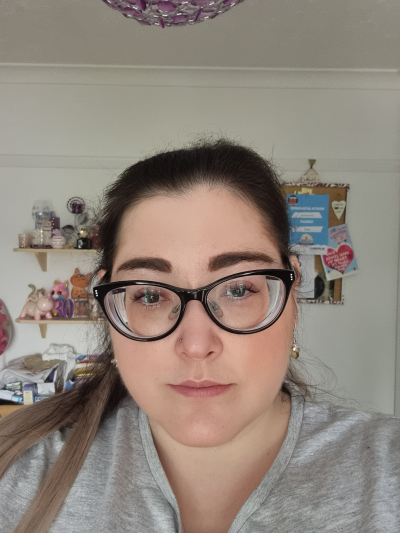Four autoimmune conditions, bereavement and problems with her employer led Kimberley to really struggle with her mental health, but mental health support helped her recover. Now, she wants to help others in a similar position.
Warning: this story talks about suicide.

Kimberley, 38, from Caldicot, has struggled with health problems all her adult life. Sadly, the difficulties she faced led to a suicide attempt in 2019.
After accessing mental health support, Kimberley recovered and is now keen on helping others by raising awareness of life with chronic conditions and their impact on mental health, particularly in young people.
Her journey started with type 1 diabetes. Just shy of her tenth birthday, she went into diabetic ketoacidosis (DKA), a serious complication of diabetes that makes the blood acidic, when misdiagnosed with hayfever. She woke up in intensive care. Kimberley said: “I was lucky to pull through. The doctor told my mum that the only thing that could be done was to pray, as I was in and out of a coma. It was a coincidence my mum gave me the Babysitters’ Club for my birthday, a book where a character has type 1 diabetes, which I developed.”
A happy and conscientious child, Kimberley took her condition seriously and tried to cope as best as she could with her type 1 diabetes. At first, she adjusted well, managing her diabetes through diet combined with her regular insulin injections.
At 18, Kimberley was diagnosed with hypothyroidism, a condition that can be associated with diabetes. After that, in her early twenties, she started getting recurrent DKA, as often as every month. Her care team thought she was skipping insulin, but the reality was that she was battling Addison’s disease, or adrenal insufficiency, also common in type 1 diabetes. Kimberley explained:
“I felt I was doing a pretty good job, adjusting to my health conditions but they interacted with each other, with osteoporosis and a calcium deficiency added to the mix. I became an autoimmune minefield."
Kimberly's mother was ill at this time and sadly passed away, and this coincided with Kimberly's diagnosis with multiple sclerosis (MS), a condition that affects the brain and nerves, which debilitated her further.
Workplace discrimination
In 2019, Kimberley was under intense pressure in her admin job at a firm in Cardiff and felt her employer was not understanding or sympathetic about her diabetes and MS, which were affecting her health and ability to work. The company didn’t allow Kimberley to do anything at her desk related to the management of her diabetes, including monitoring blood sugars.
“There were no adjustments or flexibility, I felt stigmatised and discriminated against. The situation got so bad that I tried to take my own life at the weekend and overdosed on antidepressants, as I could not face that workplace anymore and was suffering so badly with my physical and mental health."
Mental health support
“I had EMDR treatment with a psychologist following the trauma of losing my mum, the diagnosis of MS and the mental breakdown and I was amazed at what impact it had to help me recover. I have now finished my treatment and have been assured I will always have access to further psychological treatment through the diabetes team if I need it.”
It took a year to receive the psychological help she needed, but that, combined with her father’s support, allowed Kimberley to emerge from her depression, working through issues, including how she felt isolated because of her diabetes.
At the suggestion of her psychologist, she adopted a cat, Bella, who she says senses hypos and supports her with treatment: “She knows when I'm having a hypo and would wake me up if I had one in my sleep so she's a bit put out by my continuous glucose monitor alarms! She sits there and watches me eat glucose tablets and follows me to the kitchen to get my long-acting carbs. She only leaves my side when I've finished eating and she's happy my blood sugar has gone back up.”
Getting more help
The MS Society, helped Kimberley apply for disability benefits. She wanted to move on and decided not to take a grievance complaint against her former employers as she had no energy to pursue a legal battle. “I feel like a failure for having to claim benefits, but I can’t control my health, I do what I can, like using a monitor to manage my diabetes, counting carbs, doing sitting exercises and engaging with other people who have MS. I also want to get more involved with the diabetes community, as it’s something I have lived with for a long time and am always looking at ways of improving how I manage it.”
One in six working people with diabetes in the UK feel they’ve been discriminated against by their employer because of their diabetes. We've got more information about your rights at work.
If you are having a difficult time, struggling to cope or have thought about suicide contact Samaritans Cymru. You can call them for free on 116 123, or email them at jo@samaritans.org.
We’re campaigning for more consistent access to specialised psychological services embedded in diabetes teams across Wales. In some areas, people living with diabetes do not have access to psychological support and they either have to wait years or are referred to services that are not specialised in diabetes. Please get in touch to tell us about your experience accessing psychological services.
